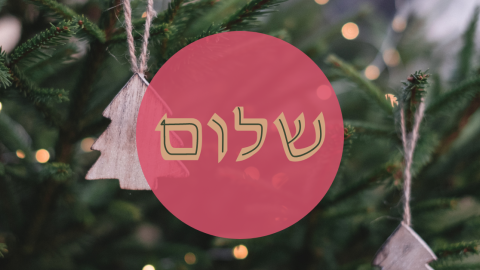
Shalom, Merry Christmas
When I was a college student, I moved to Israel a few days before Christmas. I hoped to attend the Hebrew University of Jerusalem, so I enrolled in an ulpan. There is no English word for ulpan. The closest translation is “intensive Hebrew language study,” and it’s an understatement.
I quickly got to know my classmates. They included a news broadcaster, a professor of psychology from Princeton, a pastor and his wife from Texas, a lady from Germany, a British yeshiva student, a group of nurses from the Netherlands, and a man from New York who had just brought his family to Israel.
There also was a young woman whose arms were bandaged. She had been injured in a terrorist attack on the bus she was riding. Another classmate was a young man from the Old City of Jerusalem. He spoke only Arabic and wanted to learn Hebrew.
“Shalom, talmidim,” the teacher greeted us each morning (“hello, students”). For six hours a day, five days a week, we recited new vocabulary, read aloud from our exercise books, did some role-playing, and discussed what we ate for breakfast. When we reached exhaustion, we tried to lapse into English, but our teacher pretended not to understand. It was important that we learn to express ourselves in our new common language.
As many know, shalom is the word for “peace” as well as hello. As our lessons progressed, I found the classroom a very peaceful place—as well as frustrating, sometimes awkward, and always challenging. Each of us had a vastly different story, and our own reasons for being in Hebrew class. Despite our various ages, talents, and backgrounds, we were reconciled to learning a language together—an ancient language, a biblical language, a resurrected language, an entirely new language to us.
If ever there was a life experience that taught me the meaning of reconciliation, learning the Hebrew language was it—even if it was only to function at a conversational level. You can’t learn to speak to others by shouting louder or by sheer force of will. You literally cannot make someone understand. You’ve got to reconcile yourself to learning their language and then just do the best you can. Some will be eager to engage you and receive your message, and some won’t.
My years of study helped me understand the greatest miracle of reconciliation: God became the Word Incarnate among us and reconciled us to the Father. And because of that—and only because of that—we may be reconciled to one another.
I spent the next seven Christmases in Jerusalem. For me, the meaning of faith in the Incarnate Word of God is rooted in my life there, especially messages like this one in Hosea:
I will show love to Judah; and I will save them—not by bow, sword or battle, or by horses and horsemen, but I, the LORD their God, will save them. (Hosea 1:7 NIV)
And this one from the Gospel of Luke:
Glory to God in the highest heaven, and on earth peace to those on whom his favor rests. (Luke 2:14)
I’m still learning to speak the language of peace and reconciliation. Shalom, talmidim.
May your Christmas holiday be covered with peace as you celebrate the birth of the Messiah. Shalom!
~
Scripture is quoted from THE HOLY BIBLE, NEW INTERNATIONAL VERSION®, NIV® Copyright © 1973, 1978, 1984, 2011 by Biblica, Inc.® Used by permission. All rights reserved worldwide.



